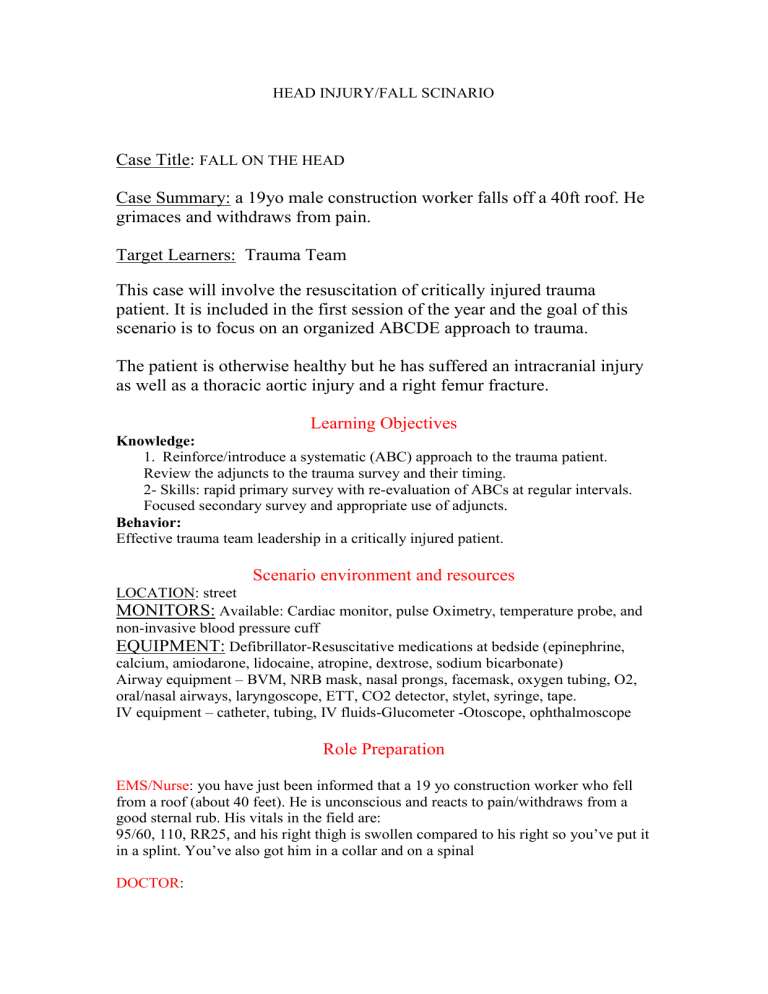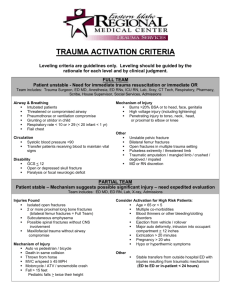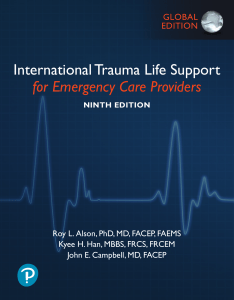
HEAD INJURY/FALL SCINARIO Case Title: FALL ON THE HEAD Case Summary: a 19yo male construction worker falls off a 40ft roof. He grimaces and withdraws from pain. Target Learners: Trauma Team This case will involve the resuscitation of critically injured trauma patient. It is included in the first session of the year and the goal of this scenario is to focus on an organized ABCDE approach to trauma. The patient is otherwise healthy but he has suffered an intracranial injury as well as a thoracic aortic injury and a right femur fracture. Learning Objectives Knowledge: 1. Reinforce/introduce a systematic (ABC) approach to the trauma patient. Review the adjuncts to the trauma survey and their timing. 2- Skills: rapid primary survey with re-evaluation of ABCs at regular intervals. Focused secondary survey and appropriate use of adjuncts. Behavior: Effective trauma team leadership in a critically injured patient. Scenario environment and resources LOCATION: street MONITORS: Available: Cardiac monitor, pulse Oximetry, temperature probe, and non-invasive blood pressure cuff EQUIPMENT: Defibrillator-Resuscitative medications at bedside (epinephrine, calcium, amiodarone, lidocaine, atropine, dextrose, sodium bicarbonate) Airway equipment – BVM, NRB mask, nasal prongs, facemask, oxygen tubing, O2, oral/nasal airways, laryngoscope, ETT, CO2 detector, stylet, syringe, tape. IV equipment – catheter, tubing, IV fluids-Glucometer -Otoscope, ophthalmoscope Role Preparation EMS/Nurse: you have just been informed that a 19 yo construction worker who fell from a roof (about 40 feet). He is unconscious and reacts to pain/withdraws from a good sternal rub. His vitals in the field are: 95/60, 110, RR25, and his right thigh is swollen compared to his right so you’ve put it in a splint. You’ve also got him in a collar and on a spinal DOCTOR: Assess the abdomen and chest. Find a normal chest exam (no deformity, subcutaneous air, normal breath sounds) but abdominal exam finds a soft abdomen with abrasions over the left side. Simulator Settings: Breathing: spontaneous Respiratory Rate: 26 O2 saturation: 98% Respiratory Pattern: regular Air Entry: good-equal both sides Breath Sounds: normal Airway Sounds: normal Cyanosis: no Cardiovascular: Heart Rate: 110 Blood Pressure: 95/60 Cardiac Rhythm: normal Heart Sounds: normal Temp: 37 Vitals will remain relatively stable throughout the scenario. With aggressive fluids the BP will respond to 108/60, HR 102. If the airway is secured O2sats will increase to 95%, if not the patient will vomit and aspirate at the 10 minute point. The Script: ABCs, primary assessment identifies patent airway but low GCS, no immediate breathing problems. Places C-spine collar. Initiates treatment (IV boluses 20cc/kg, ensures oxygenation). O2 98%, p110, BP94/60. GCS 9 -Appropriate use of primary adjuncts to locate source of bleed. Control any obvious bleeding. Support head; patient put on stretcher; secured Secures airway and ensures placement and oxygenation. ;IV ;monitor - Begins consultation process and definitive management plan. Decision to CT head, stabilizes right femur, ambulance team ready to transport the patient for further management and investigations. Doctor Khaled Mohamed




